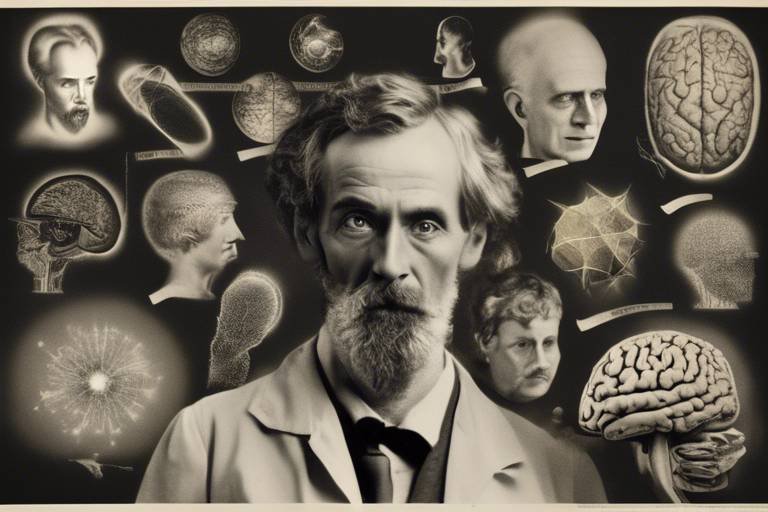Philosophy of Pharmacology - The Science of Drug Interaction
The realm of pharmacology is not just about the drugs we take; it delves deep into the intricate dance between these substances and our biological systems. Imagine a world where every pill, every injection, and every treatment is a key that unlocks a unique door within our bodies, revealing pathways to healing, pain relief, and sometimes, unforeseen consequences. This philosophy of pharmacology challenges us to consider not just the scientific data but also the ethical implications of our choices in medicine. How do we navigate this complex landscape where science meets morality? What responsibilities do we hold as both practitioners and consumers of these powerful agents? As we explore the philosophical underpinnings of pharmacology, we uncover the profound impact of drugs on our health, society, and the very fabric of life itself.
At its core, pharmacology is a blend of science and philosophy, where each drug tells a story—its origins, its journey through the body, and its ultimate effects. The interactions between drugs and biological systems are not merely chemical reactions; they are transformative experiences that can lead to healing or harm. As we dissect the layers of pharmacology, we must ask ourselves: Are we fully aware of the implications of our drug use? Are we considering the broader societal effects of our medical practices?
As we embark on this exploration, we will examine the historical context of pharmacology, understanding how our perceptions of drug interactions have evolved over time. From ancient herbal remedies to cutting-edge biopharmaceuticals, the journey of pharmacology is rich with lessons that inform our modern practices. We will also dive into the basic principles of drug interactions, including the mechanisms of action, pharmacodynamics, and pharmacokinetics, which serve as the backbone of pharmacological science.
Moreover, we cannot overlook the ethical dimensions that permeate the field of pharmacology. The questions of informed consent in drug trials and the accessibility of medications reflect our commitment to justice and equity in healthcare. As we look to the future, the advancements in genomic pharmacology and innovations in drug development promise to revolutionize our approach to medicine, tailoring treatments to individual needs while raising new ethical questions.
In essence, the philosophy of pharmacology invites us to engage in a dialogue—one that encourages critical thinking about the drugs we use and the systems we create around them. It’s a call to action for all of us, whether we are healthcare providers, patients, or simply curious minds. Together, we can navigate this fascinating landscape, armed with knowledge and a sense of responsibility.
- What is pharmacology? - Pharmacology is the study of how drugs interact with biological systems, focusing on their effects, mechanisms, and the ethical implications of their use.
- Why is the history of pharmacology important? - Understanding the history of pharmacology helps us appreciate how drug interactions have evolved and shaped modern medical practices.
- What are pharmacodynamics and pharmacokinetics? - Pharmacodynamics refers to how drugs affect the body, while pharmacokinetics studies how the body absorbs, distributes, metabolizes, and excretes drugs.
- How do ethical considerations impact pharmacology? - Ethics guide the development and use of drugs, ensuring patient safety and informed consent in drug trials.
- What does the future hold for pharmacology? - Advances in technology and personalized medicine are set to revolutionize drug therapies, making them more effective and tailored to individual patients.

Historical Context of Pharmacology
This article explores the philosophical underpinnings of pharmacology, examining how drugs interact within biological systems and the ethical implications of their use in medicine and society.
The journey of pharmacology is as rich and complex as the human experience itself. It dates back to ancient civilizations where the understanding of herbs and natural substances laid the groundwork for modern medicine. Early practitioners, often shamans or healers, relied on trial and error to discover the effects of various plants and minerals. For instance, the use of opium poppy for pain relief can be traced back to the Sumerians around 3400 BC. This early form of pharmacological practice was rudimentary, yet it sparked a curiosity that would evolve over millennia.
As we moved into the classical era, figures like Hippocrates and Galen began to formalize the study of medicine. Hippocrates, often referred to as the father of medicine, emphasized the importance of observation and documentation in understanding how drugs affect the body. Galen further advanced this by categorizing drugs based on their properties and effects, which laid the foundation for the humoral theory that dominated medical thinking for centuries.
Fast forward to the Middle Ages, where the Islamic Golden Age saw significant advancements in pharmacology. Scholars like Avicenna compiled extensive texts, such as "The Canon of Medicine," which detailed the properties of various drugs and their applications in treating ailments. This period was crucial as it preserved and expanded upon the knowledge of ancient civilizations, eventually influencing the Renaissance in Europe.
The Renaissance marked a turning point in pharmacology, with the advent of the scientific method. The invention of the printing press allowed for the widespread distribution of knowledge, and pharmacology began to be viewed through a more empirical lens. Paracelsus, a Swiss physician, challenged traditional notions by advocating for the use of chemical substances in medicine, famously stating, "All things are poison, and nothing is without poison; only the dose makes a thing not a poison." This highlighted the importance of dosage and set the stage for modern pharmacology.
In the 19th century, the isolation of active compounds from plants, such as morphine from opium and quinine from cinchona bark, revolutionized the field. This era also saw the establishment of pharmacology as a distinct scientific discipline. The development of systematic methods for studying drug interactions and effects led to the establishment of pharmacodynamics and pharmacokinetics as core principles in the field.
The 20th century brought about an explosion of drug discovery and development, fueled by advancements in chemistry and biology. The synthesis of antibiotics, such as penicillin, transformed medicine and showcased the potential of pharmacology to save lives. This period also raised important questions about the ethical implications of drug use, leading to the establishment of regulatory bodies to ensure safety and efficacy.
Today, pharmacology continues to evolve, influenced by technological advancements and a deeper understanding of human biology. The integration of genomics and biotechnology is paving the way for personalized medicine, where treatments can be tailored to individual patients based on their genetic makeup. As we look to the future, the historical context of pharmacology reminds us of the delicate balance between innovation and ethics, a theme that remains ever-relevant in the ongoing narrative of medicine.
- What is pharmacology? Pharmacology is the branch of medicine that focuses on the study of drugs, their effects on the body, and their therapeutic uses.
- How has pharmacology evolved over time? Pharmacology has evolved from ancient herbal practices to a sophisticated science that incorporates modern techniques like genomics and biotechnology.
- What are the key principles of pharmacology? The key principles include pharmacodynamics, pharmacokinetics, drug efficacy, and drug safety.
- Why is ethics important in pharmacology? Ethics ensures that drug development and use prioritize patient safety, informed consent, and equitable access to medications.

Basic Principles of Drug Interaction
When we dive into the , we enter a fascinating realm that intertwines biology, chemistry, and medicine. Understanding how drugs interact with biological systems is crucial for ensuring their effectiveness and safety. At the core of this understanding are two fundamental concepts: pharmacodynamics and pharmacokinetics. These principles serve as the backbone for how we perceive drug actions and their therapeutic outcomes.
First off, let's talk about pharmacodynamics. This is all about what drugs do to the body. Imagine your body as a complex orchestra, with drugs acting as the conductors that influence the music played by various instruments—your organs, cells, and tissues. When a drug enters your system, it binds to specific receptors, much like a key fits into a lock. This binding triggers a series of physiological responses, which can either enhance or inhibit certain functions. For instance, painkillers like ibuprofen work by blocking signals that cause pain, effectively silencing the 'screaming' of your body's pain receptors.
One of the critical aspects of pharmacodynamics is receptor theory. This theory posits that drugs exert their effects by binding to specific receptors on the surface of cells. Each receptor is like a unique puzzle piece that only fits certain drugs. When the right drug binds to its receptor, it can initiate a cascade of biological events, leading to the desired therapeutic effect. For example, antidepressants often target serotonin receptors to elevate mood. However, if a drug binds to the wrong receptor, it might cause unintended side effects, highlighting the importance of precise drug design.
Furthermore, understanding drug efficacy and potency is essential in pharmacodynamics. Efficacy refers to the maximum effect a drug can produce, while potency indicates the amount of drug needed to achieve a certain effect. Think of efficacy as the height of a roller coaster ride—some rides can take you higher than others, regardless of how steep the initial drop is. In contrast, potency is like the initial drop itself; some rides might get you screaming at a lower height, while others require a more significant drop to get the thrill.
Now, let’s shift gears and explore pharmacokinetics, which is essentially the study of what the body does to drugs. This encompasses four key processes: absorption, distribution, metabolism, and excretion—often abbreviated as ADME. Understanding these processes is vital for predicting how long a drug will stay active in the body and how effectively it can exert its action.
To illustrate, consider this breakdown:
| Process | Description |
|---|---|
| Absorption | The process by which a drug enters the bloodstream. |
| Distribution | The dispersion of the drug throughout the body's fluids and tissues. |
| Metabolism | The chemical alteration of the drug by the body, often in the liver. |
| Excretion | The removal of the drug from the body, primarily through urine or feces. |
Each of these processes can significantly influence the drug's overall effectiveness and safety profile. For example, a drug that is quickly metabolized might require more frequent dosing to maintain its therapeutic effect, while a drug that is slowly excreted may accumulate in the body, potentially leading to toxicity.
In summary, the are essential for understanding how drugs work within biological systems. By grasping the intricacies of pharmacodynamics and pharmacokinetics, healthcare professionals can make informed decisions about drug therapies, ensuring that patients receive the most effective and safest treatments possible.
- What is pharmacodynamics? Pharmacodynamics is the study of how drugs affect the body, focusing on their mechanisms of action and the physiological responses they elicit.
- What is pharmacokinetics? Pharmacokinetics examines how the body absorbs, distributes, metabolizes, and excretes drugs, influencing their effectiveness and safety.
- Why is receptor theory important? Receptor theory explains how drugs interact with specific receptors to produce their effects, which is crucial for designing effective medications.

Pharmacodynamics Explained
When we talk about pharmacodynamics, we're diving into the fascinating world of how drugs affect the body. Think of it as a dance between the drug and the body's intricate systems, where each step and movement can lead to a variety of outcomes. At its core, pharmacodynamics examines the mechanisms of action of drugs, explaining how they influence physiological functions. It's not just about whether a drug works; it’s about how it works and why it matters.
One of the key players in this dance is the concept of receptor interactions. Imagine receptors as locks on the surface of cells, and drugs as keys that fit into these locks. When a drug binds to its specific receptor, it triggers a cascade of biological events that can either amplify or inhibit bodily functions. This is crucial for achieving the desired therapeutic effects. For instance, when a pain reliever binds to pain receptors, it sends signals that can significantly reduce the sensation of pain.
Furthermore, understanding pharmacodynamics helps us grasp the concepts of drug efficacy and potency. Efficacy refers to the maximum effect a drug can produce, while potency is about the amount of drug needed to achieve that effect. To illustrate, consider two different pain medications: one might be highly potent, requiring only a small dose to relieve pain, while another may be less potent but still effective at higher doses. This differentiation is crucial for healthcare professionals when prescribing medications, as it influences treatment plans and patient outcomes.
To summarize, pharmacodynamics is about understanding the relationship between drug concentration and its effects on the body. It encompasses various factors, including:
- Receptor binding: How well a drug binds to its target receptors.
- Signal transduction: The process through which the drug-receptor interaction translates into a physiological response.
- Therapeutic window: The range of drug doses that produces therapeutic effects without causing toxicity.
In essence, pharmacodynamics is a critical field that not only informs us about how drugs work but also shapes the way we approach treatment in medicine. By understanding these principles, healthcare providers can make informed decisions that enhance patient care and optimize therapeutic outcomes.
- What is pharmacodynamics? Pharmacodynamics is the study of how drugs affect the body, including their mechanisms of action and the relationship between drug concentration and effect.
- Why is receptor interaction important? Receptor interactions are crucial because they determine how effectively a drug can produce its desired effects in the body.
- What is the difference between efficacy and potency? Efficacy refers to the maximum effect a drug can achieve, while potency indicates the amount of drug needed to reach that effect.
- How does pharmacodynamics influence drug development? Understanding pharmacodynamics helps researchers design drugs that are more effective and have fewer side effects, leading to better patient outcomes.

Receptor Theory
The is a cornerstone of pharmacology, providing a framework for understanding how drugs exert their effects on the body. At its essence, this theory posits that drugs interact with specific cellular receptors—proteins located on the surfaces of cells or within them—to initiate a physiological response. Imagine these receptors as lock-and-key mechanisms; each drug is a unique key that fits into a specific lock, triggering a cascade of biological events that can lead to therapeutic benefits or adverse effects.
Understanding receptor theory is crucial for drug design, as it allows scientists to develop medications that can selectively target these receptors, enhancing efficacy while minimizing side effects. When a drug binds to its receptor, it can either activate it (agonist) or block it (antagonist). For instance, consider how opioids work as agonists at opioid receptors to relieve pain, while naloxone acts as an antagonist to reverse opioid overdose by blocking those same receptors.
Furthermore, the concept of receptor affinity and specificity comes into play. Affinity refers to the strength of the interaction between a drug and its receptor, while specificity indicates how selectively a drug binds to its intended receptor compared to others. A drug with high affinity and specificity can produce desired effects at lower doses, reducing the likelihood of side effects. This dynamic interaction can be illustrated in the following table:
| Drug | Receptor Type | Effect | Affinity | Specificity |
|---|---|---|---|---|
| Opioid | Mu Opioid Receptor | Pain Relief | High | Moderate |
| Naloxone | Mu Opioid Receptor | Reversal of Opioid Effects | High | High |
| Beta-Blocker | Beta-Adrenergic Receptor | Lower Heart Rate | Moderate | High |
In addition to these interactions, the concept of receptor desensitization is also significant. Over time, continuous stimulation of a receptor can lead to a decrease in its responsiveness, which can affect the therapeutic outcomes of certain medications. This phenomenon is akin to a radio that becomes less sensitive to a station if it's tuned in for too long, requiring a change in frequency or a break to regain clarity.
To sum up, receptor theory not only illuminates the pathways through which drugs operate but also underscores the importance of targeted therapy in modern medicine. By understanding how drugs interact with receptors, researchers can tailor treatments that are more effective, safer, and personalized for patients. This knowledge is not just academic; it has real-world implications that can transform patient care and outcomes.
- What is receptor theory? Receptor theory is the concept that drugs interact with specific receptors in the body to produce their effects.
- Why is receptor affinity important? Receptor affinity determines how strongly a drug binds to its receptor, which influences its effectiveness and the dosage required.
- What happens during receptor desensitization? Receptor desensitization occurs when a receptor becomes less responsive to a drug after prolonged exposure, potentially reducing its effectiveness.
- How does receptor specificity impact drug development? High specificity in drug design can lead to fewer side effects and more effective treatments by targeting only the intended receptors.

Drug Efficacy and Potency
When we talk about drug efficacy and potency, we’re diving into two of the most crucial concepts in pharmacology that determine how well a medication works. Think of efficacy as the superhero of the drug world—it’s all about how much good a drug can do at its maximum effect. On the other hand, potency is like the sidekick; it tells us how much of the drug we need to achieve that maximum effect. Understanding the difference between these two can be the key to unlocking better treatments and ensuring patient safety.
To put it simply, efficacy measures the therapeutic effect of a drug. For instance, if you have a pain reliever that can reduce pain by 90%, that’s a high efficacy. However, if another pain reliever only needs a small dose to achieve the same effect, it might be considered more potent. This relationship between efficacy and potency can sometimes be confusing, but it’s essential for healthcare providers to grasp these concepts to prescribe the right medication effectively.
Let’s consider an example: imagine two different pain relievers. Pain Reliever A can reduce pain effectively with a dosage of 100 mg, while Pain Reliever B can achieve the same effect with just 10 mg. In this scenario, Pain Reliever B is more potent, but if Pain Reliever A has a maximum efficacy that’s significantly higher, it might still be the preferred choice in certain situations. This highlights that a drug can be potent yet not necessarily the most effective option available.
To further illustrate this, let’s take a look at a comparative table:
| Drug | Dosage for Maximum Effect (mg) | Maximum Efficacy (%) |
|---|---|---|
| Pain Reliever A | 100 | 90 |
| Pain Reliever B | 10 | 80 |
In this table, we can see that while Pain Reliever A has a higher maximum efficacy, Pain Reliever B is more potent. This brings us to an important point: when developing new drugs, researchers must consider both efficacy and potency to ensure that medications are not only effective but also safe and affordable for patients.
Moreover, the concepts of efficacy and potency have significant implications in clinical practice. For example, if a medication is too potent, it could lead to adverse effects or toxicity, especially if the patient has a lower tolerance or sensitivity. Conversely, a drug with high efficacy but low potency might require higher doses, which can also lead to side effects or complications. Thus, striking the right balance is paramount.
Ultimately, by understanding drug efficacy and potency, healthcare providers can make informed decisions about which medications to prescribe, ensuring that patients receive the most effective treatment tailored to their individual needs. This knowledge not only enhances therapeutic outcomes but also fosters a more profound respect for the science of pharmacology and its impact on human health.
- What is the difference between efficacy and potency? Efficacy refers to the maximum effect a drug can produce, while potency indicates the amount of drug needed to achieve that effect.
- Why is it important to understand these concepts? Understanding efficacy and potency helps healthcare providers choose the right medication and dosage for patients, minimizing risks and maximizing benefits.
- Can a drug be highly potent but have low efficacy? Yes, a drug can be very potent (requiring a small dose to work) but may not produce a significant therapeutic effect compared to other drugs.

Pharmacokinetics Overview
Pharmacokinetics is a fascinating field that delves into the journey of a drug through the body, examining how it is absorbed, distributed, metabolized, and ultimately excreted. This process is crucial for understanding not only how drugs work but also their therapeutic effectiveness and safety profiles. Imagine you’re a traveler embarking on a long journey; the drug must navigate various terrains (the body's systems) and face different challenges (biological barriers) before reaching its final destination (the site of action).
To break it down further, pharmacokinetics can be divided into four main phases:
- Absorption: This is the first step, where the drug enters the bloodstream. Factors like the route of administration (oral, intravenous, etc.), the drug's formulation, and the presence of food can significantly influence this phase.
- Distribution: Once in the bloodstream, the drug circulates throughout the body. Its distribution can be affected by blood flow, the drug's affinity for tissues, and whether it can cross cell membranes.
- Metabolism: Often referred to as biotransformation, this phase involves the chemical alteration of the drug, primarily in the liver. Here, drugs can be converted into active or inactive metabolites, impacting their therapeutic effects.
- Excretion: Finally, the body eliminates the drug, primarily through the kidneys, but also via bile, sweat, and breath. The rate of excretion can influence how long a drug remains effective in the body.
Understanding these phases is vital for healthcare professionals when determining the appropriate dosages and timing for drug administration. For instance, a medication that is rapidly absorbed and quickly excreted may require more frequent dosing to maintain its therapeutic effect. Conversely, a drug that is slowly absorbed may need less frequent administration. This intricate dance of pharmacokinetics ensures that patients receive the right amount of medication at the right times, maximizing benefits while minimizing potential side effects.
Moreover, pharmacokinetics is not a one-size-fits-all scenario. Individual factors such as age, weight, genetics, and overall health can significantly alter how a drug is processed in the body. For example, elderly patients may metabolize drugs more slowly, necessitating careful dose adjustments to avoid toxicity. This variability highlights the importance of personalized medicine, where treatments are tailored to the individual’s unique pharmacokinetic profile.
In conclusion, pharmacokinetics serves as a critical framework for understanding drug behavior in the body. By grasping how drugs move through various biological systems, healthcare providers can make informed decisions that enhance treatment efficacy and patient safety. As we continue to advance our knowledge in this field, the potential for developing more effective and individualized therapies will only grow, promising a brighter future for pharmacological interventions.
- What is pharmacokinetics?
Pharmacokinetics is the study of how drugs are absorbed, distributed, metabolized, and excreted by the body. - Why is pharmacokinetics important?
Understanding pharmacokinetics helps healthcare professionals determine the appropriate dosages and timing for drug administration, ensuring maximum efficacy and safety. - How do individual factors influence pharmacokinetics?
Factors such as age, weight, genetics, and overall health can significantly affect how a drug is processed in the body, leading to variations in drug effectiveness and safety.

Ethical Considerations in Pharmacology
The realm of pharmacology is not just a scientific pursuit; it is deeply intertwined with ethical considerations that shape how drugs are developed, tested, and used in society. As we navigate through the complexities of drug interactions, it becomes imperative to address the ethical implications that arise. The responsibility of ensuring patient safety, informed consent, and equitable access to medications weighs heavily on the shoulders of healthcare professionals and researchers alike. In a world where the line between innovation and morality can sometimes blur, understanding these ethical dimensions is crucial.
One of the most critical aspects of ethical pharmacology is the concept of informed consent. This is particularly vital during clinical trials, where participants must be fully aware of the risks and benefits associated with the drug interventions they might undergo. Imagine being part of a groundbreaking study, yet not knowing the potential consequences of the treatment you are receiving. Informed consent is not merely a formality; it is a fundamental right that empowers individuals to make educated decisions about their health. Researchers must ensure that participants understand not only the potential benefits but also the risks involved, fostering an environment of trust and transparency.
Moreover, the issue of access to medications raises significant ethical questions. Despite the advancements in pharmacology, disparities in the availability and affordability of essential drugs persist, leaving vulnerable populations at a disadvantage. Consider the stark reality: while some individuals have easy access to life-saving medications, others are left to navigate a maze of bureaucracy and financial barriers. This inequity poses a moral dilemma for society, as it challenges the principles of justice and equality in healthcare. It is essential for policymakers and pharmaceutical companies to work collaboratively to address these disparities, ensuring that everyone has the opportunity to benefit from medical advancements.
To illustrate the ethical challenges in pharmacology, let's take a look at a few key considerations:
- Patient Autonomy: Respecting a patient's right to make informed choices about their treatment.
- Equity in Healthcare: Ensuring that all individuals have access to necessary medications, regardless of socioeconomic status.
- Transparency in Research: Maintaining honesty about the risks and benefits during drug trials to uphold trust in the medical community.
Furthermore, the ethical landscape of pharmacology is constantly evolving, especially with the rise of new technologies and methodologies. As we delve deeper into the world of personalized medicine and genomic pharmacology, ethical considerations will continue to be at the forefront of discussions. The ability to tailor drug therapies based on individual genetic profiles opens up exciting possibilities but also raises questions about privacy, consent, and the potential for genetic discrimination.
In summary, the ethical considerations in pharmacology are multifaceted and demand careful attention from all stakeholders involved. From ensuring informed consent in clinical trials to addressing disparities in medication access, the principles of ethics must guide the practices and policies within this field. As we look to the future, fostering a culture of ethical awareness and responsibility will be crucial in shaping a pharmacological landscape that prioritizes patient welfare and societal good.
Here are some common questions regarding the ethical considerations in pharmacology:
- What is informed consent in pharmacology? Informed consent is the process by which participants are educated about the risks and benefits of a clinical trial before agreeing to participate.
- Why is access to medications an ethical issue? Access to medications raises ethical concerns because it can create disparities in healthcare, where some individuals may not afford or have access to essential drugs.
- How does technology impact ethical considerations in pharmacology? Advances in technology, such as personalized medicine, introduce new ethical dilemmas related to privacy, consent, and the equitable distribution of treatments.

Informed Consent in Drug Trials
Informed consent is more than just a formality; it is a fundamental ethical requirement in the realm of drug trials. Imagine you're about to embark on a thrilling adventure, but before you set off, you need to understand the terrain, the possible dangers, and the rewards that await you. This is precisely what informed consent aims to achieve for participants in clinical trials. It ensures that individuals are fully aware of the risks, benefits, and the overall purpose of the study they are joining. Without this crucial step, the very foundation of ethical research would crumble, leaving participants vulnerable and uninformed.
During the informed consent process, researchers are tasked with providing comprehensive information about the trial. This includes details about the drug being tested, how it works, potential side effects, and the procedures involved. Participants should feel empowered to ask questions and seek clarification on any aspect of the trial. After all, they are not just subjects; they are individuals making a conscious choice to contribute to medical science.
To facilitate understanding, the information should be presented in a clear and accessible manner. This often involves using layman's terms rather than complex medical jargon, allowing participants from various backgrounds to grasp the essential details. The consent form itself can be a daunting document, but it should serve as a tool for empowerment, not intimidation.
Moreover, informed consent is not a one-time event; it is an ongoing dialogue. As the trial progresses, participants should be kept informed about any new findings or changes to the study. This continuous communication fosters trust and reassures participants that their well-being is a top priority. For example, if new side effects are discovered, it is the responsibility of the researchers to update participants, ensuring they remain informed.
In summary, informed consent is a cornerstone of ethical drug trials, safeguarding the rights and welfare of participants. It transforms the relationship between researchers and participants into a partnership based on transparency and respect. As we move forward in the field of pharmacology, prioritizing informed consent will ensure that the pursuit of medical knowledge does not come at the cost of individual autonomy.
- What is informed consent? Informed consent is the process through which participants are made aware of the risks, benefits, and purpose of a clinical trial before agreeing to take part.
- Why is informed consent important? It protects the rights of participants, ensuring they have the necessary information to make an informed decision about their involvement in a study.
- Can participants withdraw from a trial? Yes, participants have the right to withdraw from a trial at any time without any penalties or loss of benefits.
- How is informed consent obtained? Researchers provide detailed information about the study and obtain consent through a signed document, ensuring participants understand what they are agreeing to.

Access to Medications
Access to medications is a critical issue that transcends borders and impacts countless lives. The ability to obtain necessary drugs can be a matter of life and death, yet many individuals face significant barriers in accessing these essential treatments. The disparities in availability and affordability of medications raise profound ethical questions about equity and justice in healthcare. Imagine a world where someone is diagnosed with a serious illness but cannot afford the prescribed medication. It’s a harsh reality that many face, and it begs the question: why should access to life-saving treatments be determined by one’s financial status?
In many parts of the world, especially in low-income countries, the lack of infrastructure and resources leads to a scarcity of essential medications. According to the World Health Organization, approximately 2 billion people lack access to essential medicines. This is not just a statistic; it represents real people struggling with health issues. The reasons for this lack of access can be multifaceted, including:
- High costs: Many medications are prohibitively expensive, especially in regions where healthcare systems are underfunded.
- Supply chain issues: Inadequate distribution networks can lead to shortages of essential drugs in certain areas.
- Regulatory barriers: Complex regulations can delay the availability of new medications in the market.
Furthermore, the ethical implications of these barriers are profound. Healthcare providers and policymakers must grapple with the responsibility of ensuring that all individuals have access to the medications they need. The principle of justice in healthcare emphasizes that everyone, regardless of their socioeconomic status, should have equal access to necessary treatments. This principle is not just a lofty ideal; it should be a guiding force in the development of healthcare policies and practices.
To address these issues, several strategies can be implemented. For instance, governments and organizations can work towards creating policies that promote affordable pricing for medications, ensuring that essential drugs are within reach for everyone. Additionally, initiatives that focus on improving healthcare infrastructure, particularly in underserved areas, can make a significant difference. By investing in local pharmacies and healthcare facilities, we can help bridge the gap in access to medications.
Moreover, collaboration between pharmaceutical companies, governments, and non-profit organizations can lead to innovative solutions. Programs that provide medications at reduced costs or even for free to those in need can alleviate some of the burdens faced by vulnerable populations. This collaborative approach not only addresses the immediate needs of individuals but also fosters a sense of community and shared responsibility in healthcare.
In conclusion, access to medications is not merely a healthcare issue; it is a fundamental human right that requires urgent attention. As we move forward, it is essential to prioritize equitable access to medications, ensuring that everyone has the opportunity to lead a healthy life. After all, when it comes to health, no one should be left behind.
- What are the main barriers to accessing medications?
The main barriers include high costs, supply chain issues, and regulatory hurdles that can delay the availability of essential drugs.
- How can governments improve access to medications?
Governments can implement policies that promote affordable pricing, improve healthcare infrastructure, and collaborate with pharmaceutical companies to provide medications at reduced costs.
- Why is access to medications considered a human right?
Access to medications is essential for maintaining health and well-being. Denying individuals necessary treatments based on their financial status is a violation of their right to health.

Future Directions in Pharmacology
The landscape of pharmacology is ever-evolving, driven by rapid advancements in technology and a deeper understanding of human biology. As we look to the future, it's exciting to consider how these developments will reshape drug therapy and patient care. One of the most promising areas is the rise of personalized medicine, which tailors treatment based on individual patient characteristics, including genetic makeup, lifestyle, and environmental factors. Imagine a world where your medication is specifically designed for you, maximizing efficacy and minimizing side effects. This is not just a dream; it's becoming a reality.
At the forefront of this revolution is genomic pharmacology. This field investigates how genetic variations influence drug responses, paving the way for customized therapies. For instance, some individuals metabolize certain medications differently due to genetic differences, which can lead to either ineffective treatment or harmful side effects. By understanding these genetic factors, healthcare providers can prescribe medications that are more effective for each patient, ensuring that treatment is both safe and efficacious.
In addition to genomic advancements, innovations in drug development are significantly impacting pharmacology. Technologies such as biotechnology and nanotechnology are transforming how we create and deliver medications. For example, nanotechnology allows for the development of drug delivery systems that can target specific cells or tissues, improving the precision of treatment. This means that instead of a one-size-fits-all approach, drugs can be engineered to deliver therapeutic agents directly to diseased cells, sparing healthy tissues and reducing side effects.
Furthermore, the integration of artificial intelligence (AI) in pharmacology is changing the game. AI algorithms can analyze vast amounts of data to identify potential drug candidates, predict their effectiveness, and even optimize clinical trial designs. This not only accelerates the drug development process but also enhances the likelihood of successful outcomes. The ability to simulate drug interactions and predict patient responses before actual clinical trials can save time and resources, ultimately leading to safer and more effective medications.
As we embrace these advancements, it's crucial to consider the ethical implications they bring. The accessibility of personalized medicine and advanced therapies raises questions about equity in healthcare. Will everyone have access to these groundbreaking treatments, or will they remain a privilege for the few? It's essential for policymakers and healthcare providers to address these disparities to ensure that all patients benefit from the latest innovations in pharmacology.
- What is personalized medicine? Personalized medicine is an approach that tailors medical treatment to the individual characteristics of each patient, including their genetic profile.
- How does genomic pharmacology work? Genomic pharmacology studies how genetic variations affect individual responses to drugs, helping to optimize treatment plans.
- What role does AI play in pharmacology? AI helps analyze data to identify potential drug candidates and optimize clinical trials, improving the drug development process.
- Are there ethical concerns with new pharmacological advancements? Yes, issues of accessibility and equity in healthcare are significant concerns as new treatments emerge.

Genomic Pharmacology
Genomic pharmacology is an exciting frontier in the realm of medicine, where the intricate dance between our genes and drug responses takes center stage. Imagine a world where medications are tailored specifically to your genetic makeup, enhancing effectiveness while minimizing side effects. This is not just a futuristic dream; it's the reality that genomic pharmacology is striving to achieve. By understanding how genetic variations influence the way our bodies process and respond to drugs, researchers are paving the way for personalized medicine. This approach allows healthcare providers to prescribe the right drug at the right dose for each individual, transforming the traditional one-size-fits-all model of treatment.
At the core of genomic pharmacology lies the study of single nucleotide polymorphisms (SNPs), which are variations in a single nucleotide that occur at a specific position in the genome. These tiny changes can have profound effects on drug metabolism, efficacy, and toxicity. For instance, consider a patient who is prescribed a common blood thinner, warfarin. The effectiveness of warfarin can vary significantly from person to person, largely due to genetic differences in enzymes that metabolize the drug. By analyzing a patient's genetic profile, doctors can determine the optimal dosage, reducing the risk of adverse reactions and ensuring better therapeutic outcomes.
Moreover, genomic pharmacology is not limited to just one or two drugs; it has the potential to revolutionize the entire pharmaceutical landscape. As we accumulate more data on genetic variations and their effects on drug interactions, we can foresee a future where drug development is increasingly informed by genetic insights. This could lead to the creation of new medications that target specific genetic profiles, providing an unprecedented level of precision in treatment.
To illustrate the impact of genomic pharmacology, consider the following table, which highlights some common medications and their associated genetic factors:
| Medication | Genetic Factor | Impact on Drug Response |
|---|---|---|
| Warfarin | CYP2C9, VKORC1 | Variability in metabolism and dosing requirements |
| Clopidogrel | CYP2C19 | Reduced effectiveness in certain genotypes |
| Abacavir | HLA-B*5701 | Risk of hypersensitivity reaction |
As we venture further into the era of genomic pharmacology, it's essential to address the ethical implications that accompany these advancements. While the promise of personalized medicine is tantalizing, it raises questions about accessibility and equity. Will everyone have access to genetic testing and the tailored therapies that come with it? Or will these innovations only be available to a privileged few? These are critical considerations that must be navigated as we embrace the future of pharmacology.
In conclusion, genomic pharmacology stands at the intersection of genetics and pharmacology, offering a glimpse into a more personalized and effective approach to medicine. By understanding the genetic underpinnings of drug interactions, we can move closer to a healthcare system that truly caters to individual needs, ensuring that everyone can benefit from the latest advancements in drug therapy.
- What is genomic pharmacology? Genomic pharmacology is the study of how genetic variations affect individual responses to drugs, leading to more personalized treatment options.
- How does genetic testing influence medication prescriptions? Genetic testing can help healthcare providers determine the most effective drug and dosage for a patient based on their genetic profile.
- Are there any risks associated with genomic pharmacology? While genomic pharmacology holds great promise, ethical concerns regarding access and equity in healthcare must be addressed.
- Can genomic pharmacology improve drug safety? Yes, by tailoring medications to individual genetic profiles, the likelihood of adverse drug reactions can be significantly reduced.

Innovations in Drug Development
In recent years, the landscape of drug development has undergone a remarkable transformation, driven by innovative technologies that promise to enhance the efficacy of treatments while minimizing side effects. One of the most significant advancements has been the incorporation of biotechnology into the drug development process. This approach leverages biological systems to create drugs that are not only effective but also tailored to the specific needs of patients. For instance, monoclonal antibodies, which are engineered to target specific cells, have revolutionized the treatment of various diseases, including cancer and autoimmune disorders.
Another groundbreaking innovation is the use of nanotechnology in drug delivery systems. By manipulating materials on a nanoscale, scientists can develop carriers that transport drugs directly to the affected area in the body, thereby improving therapeutic outcomes and reducing systemic side effects. Imagine a tiny delivery vehicle that knows exactly where to go—this is the promise of nanotechnology in pharmacology. The precision of these systems can significantly enhance the effectiveness of drugs, making treatments more efficient and patient-friendly.
Furthermore, the advent of artificial intelligence (AI) in drug development has opened up new avenues for research and discovery. AI algorithms can analyze vast amounts of data to identify potential drug candidates, predict their interactions within the body, and even optimize the drug design process. This capability not only accelerates the pace of drug development but also increases the likelihood of success by allowing researchers to focus on the most promising candidates early in the process.
As we look to the future, the integration of these technologies is set to redefine the way drugs are developed. For example, the combination of genomic data with advanced computational methods can lead to the creation of personalized medications tailored to an individual's genetic makeup. This means that treatments can be designed to work more effectively for specific populations, reducing the trial-and-error approach that has long characterized pharmacology.
In summary, the innovations in drug development are not just incremental improvements; they represent a paradigm shift towards a more precise, efficient, and patient-centered approach to medicine. As these technologies continue to evolve, we can expect to see a new era of therapies that are not only more effective but also more accessible to those who need them. The future of pharmacology is bright, fueled by creativity and scientific breakthroughs that promise to change lives.
- What is biotechnology in drug development?
Biotechnology involves using living organisms or biological systems to develop products, including drugs. It allows for the creation of more targeted therapies, such as monoclonal antibodies. - How does nanotechnology improve drug delivery?
Nanotechnology enables the development of tiny carriers that can deliver drugs directly to the target area in the body, enhancing effectiveness and minimizing side effects. - What role does artificial intelligence play in drug discovery?
AI can analyze large datasets to identify potential drug candidates and predict their interactions, which speeds up the drug development process and increases the chances of success. - What is personalized medicine?
Personalized medicine tailors treatments to individual genetic profiles, ensuring that therapies are more effective for specific populations.
Frequently Asked Questions
- What is pharmacology?
Pharmacology is the branch of medicine that focuses on the study of drugs and their interactions within biological systems. It encompasses understanding how drugs affect the body and how the body processes these drugs, which is crucial for developing effective treatments.
- How do drugs interact with the body?
Drugs interact with the body primarily through mechanisms of action, which include binding to specific receptors, altering physiological functions, and influencing biochemical pathways. This interaction can lead to therapeutic effects or side effects, depending on various factors such as dosage and individual patient characteristics.
- What is the difference between pharmacodynamics and pharmacokinetics?
Pharmacodynamics refers to the effects of drugs on the body, including how they produce their effects and the relationship between drug concentration and effect. On the other hand, pharmacokinetics studies how the body absorbs, distributes, metabolizes, and excretes drugs, providing insight into their therapeutic effectiveness and safety.
- Why is informed consent important in drug trials?
Informed consent is crucial in drug trials because it ensures that participants are fully aware of the potential risks and benefits associated with the study. This ethical practice promotes transparency and respects the autonomy of individuals, allowing them to make informed decisions about their participation.
- What ethical considerations are involved in pharmacology?
Ethical considerations in pharmacology include ensuring patient safety, obtaining informed consent, and addressing issues of access to medications. These factors are essential for maintaining trust in the healthcare system and ensuring that all patients receive fair treatment and access to necessary therapies.
- How is personalized medicine shaping the future of pharmacology?
Personalized medicine is revolutionizing pharmacology by tailoring drug therapies to individual genetic profiles. This approach optimizes treatment effectiveness and minimizes adverse effects, paving the way for more precise and effective healthcare solutions.
- What innovations are currently impacting drug development?
Innovations such as biotechnology and nanotechnology are significantly impacting drug development. These advancements allow for the creation of more targeted therapies, improving drug efficacy and reducing side effects, ultimately enhancing patient outcomes.



















